
12 Best Marketing Automation Tools for Small Business (2025)
Published
Running a small business means wearing multiple hats, and the marketing hat often demands the most time. Juggling email campaigns, social media posts, lead nurturing, and customer follow-ups can quickly become overwhelming, pulling you away from core business operations. This is where marketing automation steps in, not as a luxury for large enterprises, but as a critical lifeline for growth-focused small businesses. These platforms handle repetitive tasks, ensuring consistent communication and personalized engagement with your audience, even while you sleep. The right tool can transform your efficiency, allowing you to scale your efforts without scaling your team.
This guide is designed to help you cut through the noise and find the best marketing automation tools for your small business. We've moved beyond generic feature lists to provide a detailed, practical analysis of the top platforms available. For each tool, you'll find an honest assessment of its strengths and limitations, ideal use cases for specific business models, and important implementation considerations. We’ll explore platforms like HubSpot, ActiveCampaign, Mailchimp, Brevo, and many others.
To make your decision easier, every entry includes screenshots for a real-world feel and direct links to explore further. Our goal is simple: to provide a clear, comprehensive resource that equips you to select the platform that perfectly aligns with your budget, technical skills, and strategic goals. Let’s dive in and find the right fit for you.
1. HubSpot Marketing Hub
HubSpot Marketing Hub is a powerhouse in the world of marketing automation tools for small business, renowned for its comprehensive, all-in-one approach. It integrates a powerful CRM with marketing, sales, service, and content management tools, creating a unified system. This integration is its key differentiator; instead of patching together multiple apps, you get a seamless flow of data from a lead's first website visit to their conversion into a loyal customer.
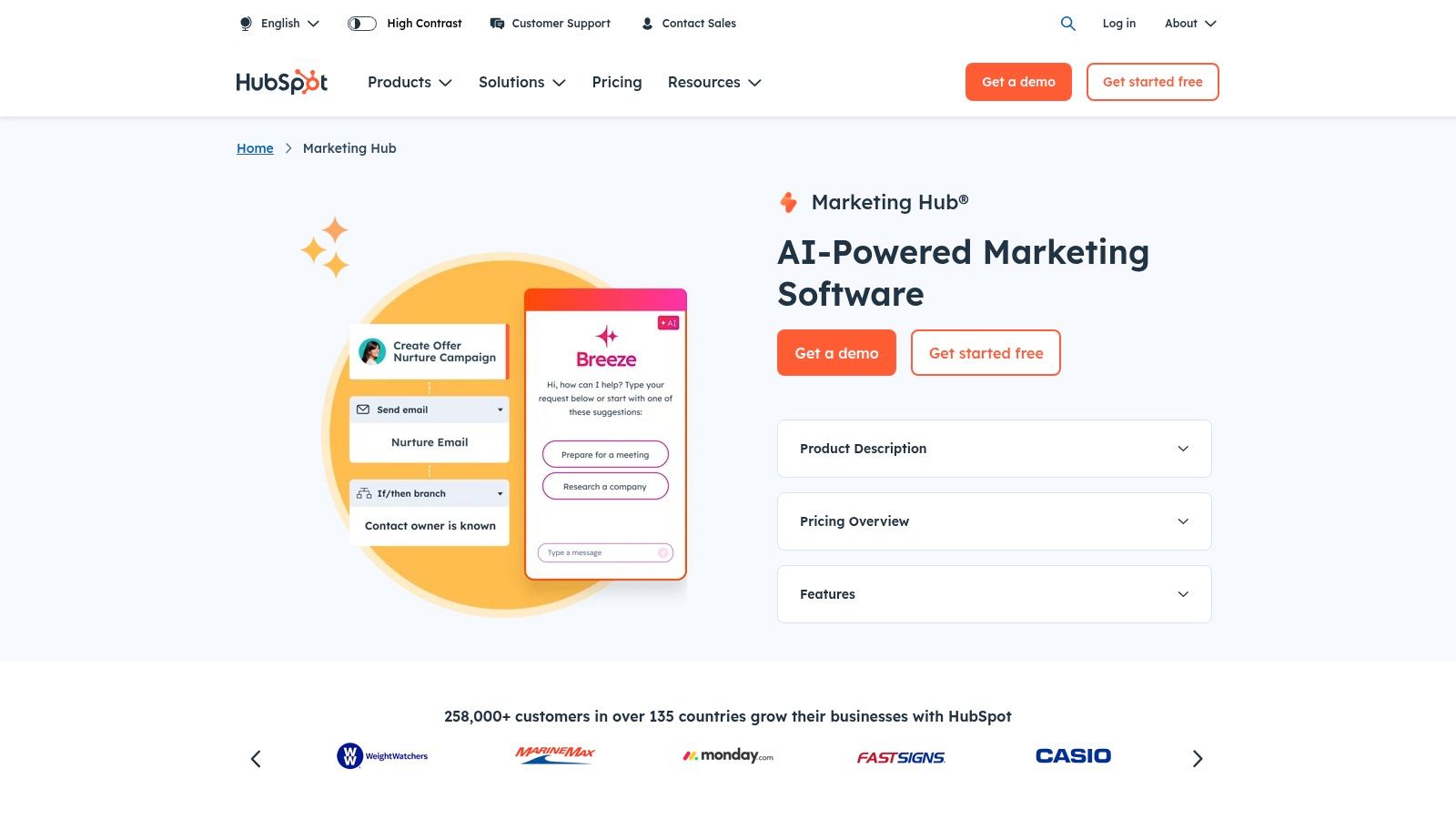
The platform excels with its visual workflow builder, allowing users to create sophisticated email nurture sequences, update contact properties, and trigger internal notifications without writing a single line of code. Its user-friendly interface is backed by the extensive HubSpot Academy, a free resource offering certifications and training that significantly flattens the learning curve.
Key Features & Pricing
- Core Functionality: Visual workflow automation, email marketing, landing page builder, and social media management.
- Ideal Use Case: A small business planning for significant growth that needs a scalable, integrated CRM and marketing solution from day one.
- Pricing: HubSpot offers a free tools tier with basic features. Paid plans for Marketing Hub start with the "Starter" plan (around $18/month, billed annually), with "Professional" and "Enterprise" tiers offering more advanced automation and analytics at a significantly higher cost.
Pros:
- Excellent user interface and extensive free educational resources.
- Scales perfectly from a small startup to a large enterprise.
- Deep integration with its own free, robust CRM.
Cons:
- Can become expensive quickly as you scale or need more advanced features.
- The sheer number of features can feel overwhelming for absolute beginners.
Website: https://hubspot.com/products/marketing
2. ActiveCampaign
ActiveCampaign positions itself as a customer experience automation platform, going beyond simple email campaigns. It’s a favorite among small businesses that need powerful, granular automation without the enterprise-level price tag of competitors. Its key strength lies in its flexibility; you can build incredibly detailed automation workflows based on almost any customer behavior, from website visits and link clicks to purchase history, creating deeply personalized marketing.
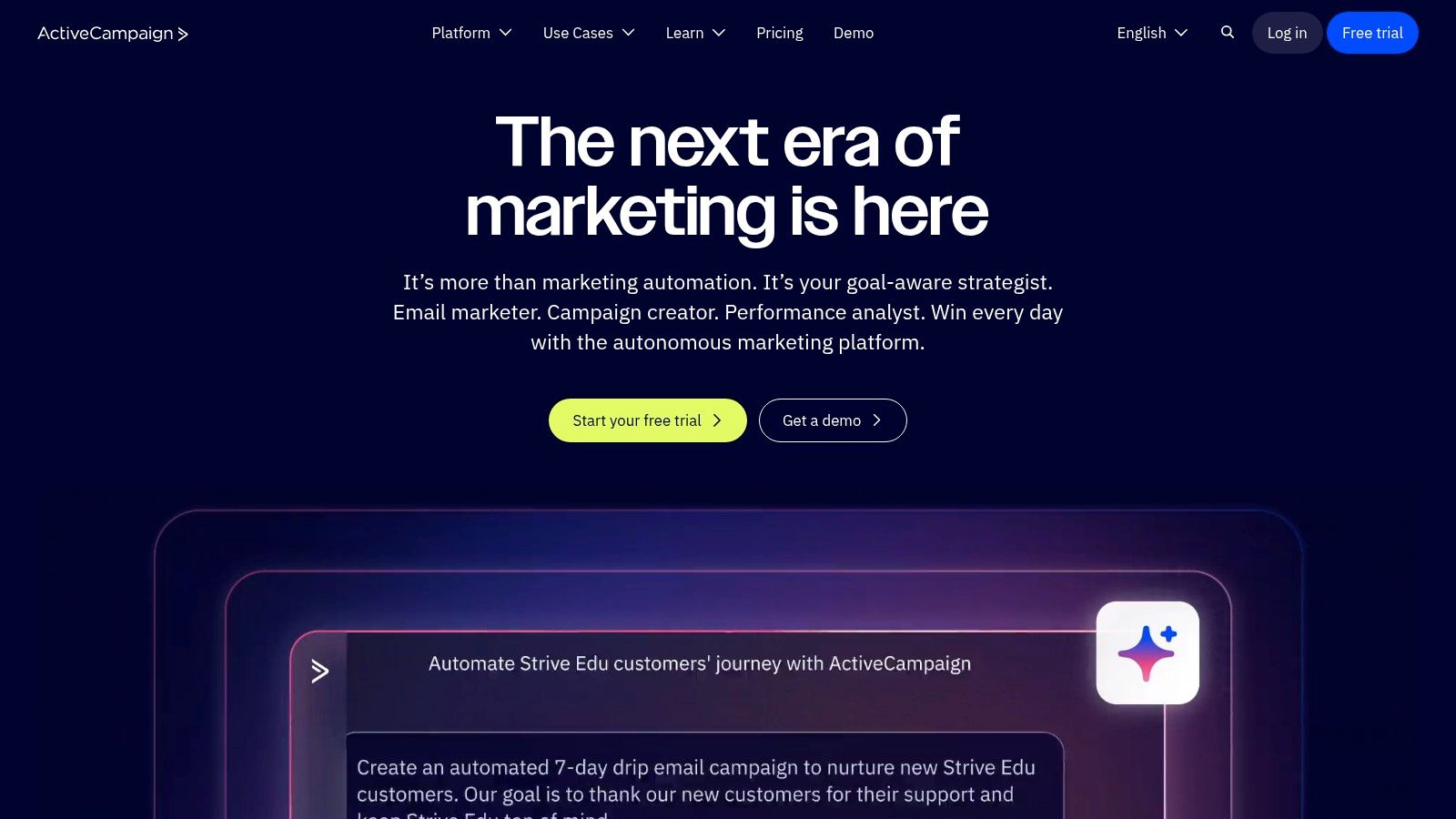
This platform excels at combining email marketing, CRM, and sales automation into one cohesive tool. The visual workflow builder is powerful, allowing for conditional logic ("if/then/else"), lead scoring, and SMS messaging. Unlike some all-in-one solutions where specific features feel like an afterthought, ActiveCampaign's core automation engine is robust and central to its value, making it one of the most capable marketing automation tools for small business owners who are serious about personalization.
Key Features & Pricing
- Core Functionality: Advanced marketing automation, email marketing, sales CRM, and site messaging.
- Ideal Use Case: A small business focused on e-commerce or digital products that wants to implement sophisticated, behavior-driven marketing funnels.
- Pricing: Pricing is based on contact list size. The "Marketing Lite" plan starts around $29/month (billed annually), with "Plus" and "Professional" tiers adding more advanced features like landing pages, lead scoring, and sales automation.
Pros:
- Highly customizable and powerful automation workflows.
- Strong integration capabilities with hundreds of third-party apps.
- Excellent balance of advanced features and affordability.
Cons:
- The interface can have a steeper learning curve for absolute beginners.
- Pricing can become expensive as your contact list grows or you need higher-tier features.
Website: https://activecampaign.com
3. Mailchimp
Mailchimp is one of the most recognized names in email marketing, and for good reason. It has evolved from a simple newsletter tool into a robust marketing automation platform for small business owners. Its main strength lies in its accessibility and user-friendly design, making it an excellent starting point for businesses that are new to automation. The platform allows you to move beyond basic email blasts and into creating automated customer journeys, such as welcome series, abandoned cart reminders, and post-purchase follow-ups.
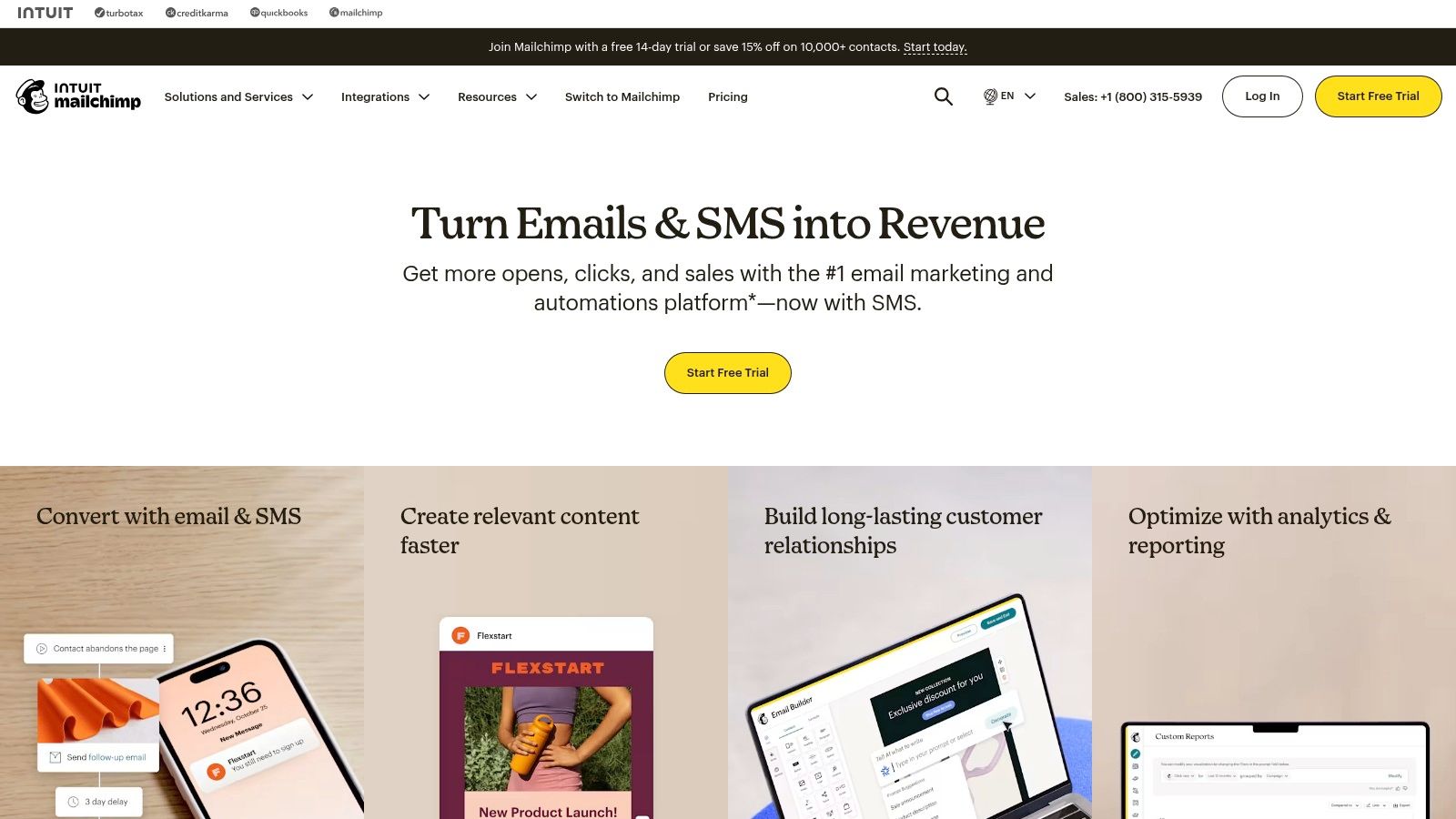
While its automation capabilities are not as complex as some all-in-one CRMs, Mailchimp provides powerful, easy-to-implement workflows that deliver tangible results. The visual journey builder helps you map out customer interactions, and its strong e-commerce integrations, especially with Shopify, make it a go-to for online retailers. Its focus remains squarely on email and audience management, making it a specialized yet powerful tool.
Key Features & Pricing
- Core Functionality: Email campaign creation, visual customer journey builder, audience segmentation and tagging, and A/B testing.
- Ideal Use Case: Small businesses, particularly e-commerce stores and content creators, who need a user-friendly and effective email automation solution.
- Pricing: A generous free plan is available for up to 500 contacts with basic automation. Paid plans start with "Essentials" (around $13/month) and scale with the "Standard" and "Premium" tiers, which unlock more advanced automation and audience insights.
Pros:
- Extremely intuitive and user-friendly interface.
- Excellent free plan for businesses just starting out.
- Vast library of integrations with other popular apps and services.
Cons:
- Pricing can become costly as your contact list grows.
- Automation features on lower-tier plans are limited compared to competitors.
Website: https://mailchimp.com
4. Brevo (formerly Sendinblue)
Brevo positions itself as one of the most accessible and cost-effective marketing automation tools for small business, bundling email, SMS, chat, and CRM into one unified platform. Its key strength lies in providing a robust set of features, including complex automation workflows, at a price point that is significantly lower than many competitors. This makes it an attractive option for startups and small businesses that need powerful tools without a hefty enterprise-level budget.
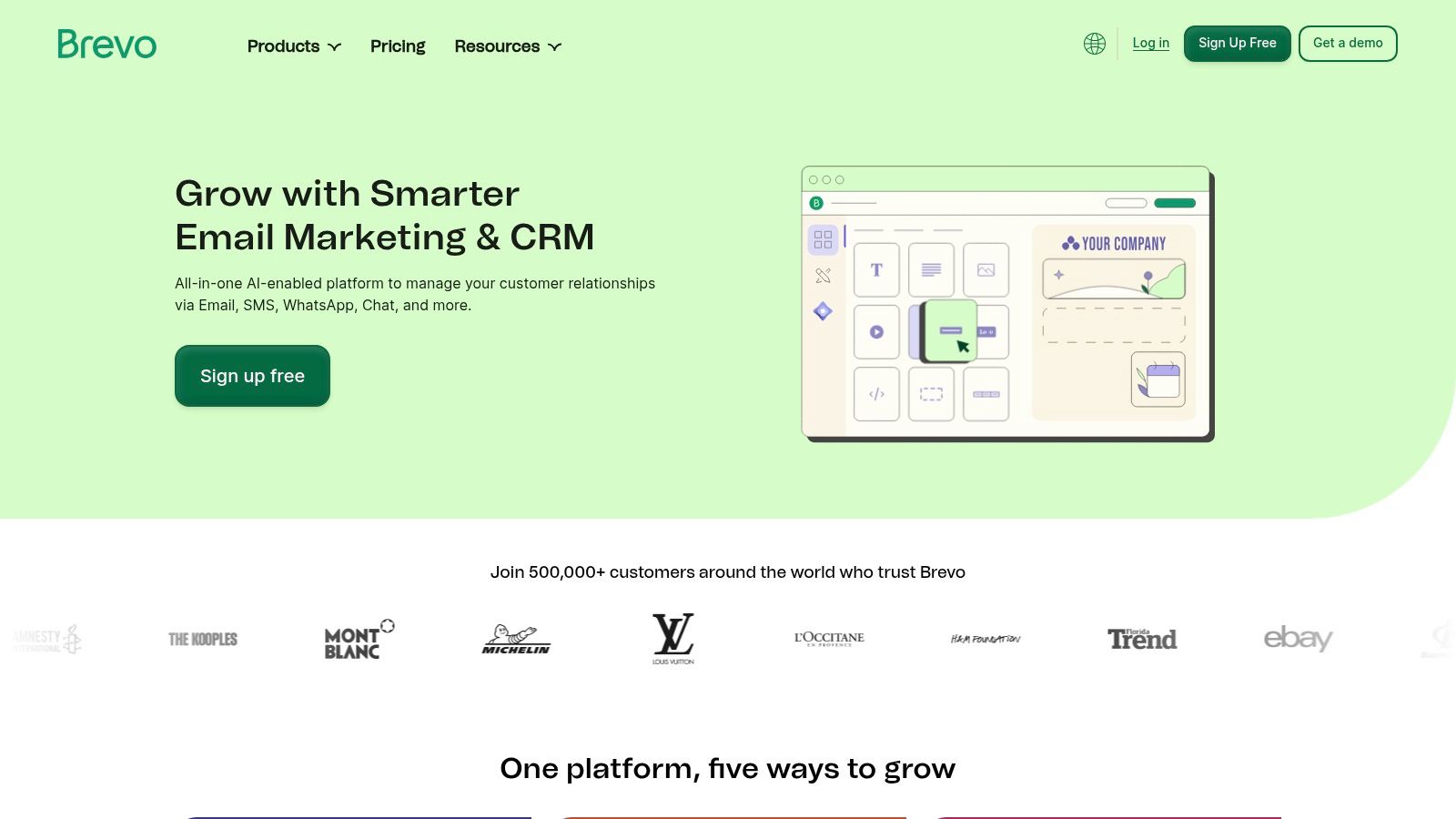
The platform’s automation workflow editor is intuitive, allowing users to build multi-step campaigns based on user behavior, such as email opens, link clicks, or website visits. Brevo also excels with its transactional email capabilities, ensuring high deliverability for critical messages like password resets and order confirmations, which is a standout feature at its price level.
Key Features & Pricing
- Core Functionality: Email and SMS marketing, marketing automation workflow editor, transactional emails, and landing page builder.
- Ideal Use Case: A budget-conscious small business or startup needing an all-in-one marketing suite with strong email and SMS capabilities.
- Pricing: Brevo offers a generous free plan with up to 300 emails per day. Paid plans start with the "Starter" tier (around $25/month) and move up to "Business" and "BrevoPlus" for more advanced features and higher sending volumes.
Pros:
- Highly competitive pricing with a feature-rich free tier.
- Combines multiple marketing channels (email, SMS, chat) in one place.
- Strong focus on deliverability for both marketing and transactional emails.
Cons:
- The range of third-party integrations is more limited than some larger platforms.
- More advanced automation triggers and features are reserved for higher-tier plans.
Website: https://www.brevo.com
5. Keap (formerly Infusionsoft)
Keap, widely known by its former name Infusionsoft, has long been a major player among marketing automation tools for small business, particularly for service-based entrepreneurs and consultants. It distinguishes itself by tightly integrating a CRM with sales pipeline management, marketing automation, and e-commerce functionalities like invoicing and payments. This all-in-one design aims to centralize the entire client lifecycle, from lead capture and nurturing to closing sales and processing payments, all within a single system.
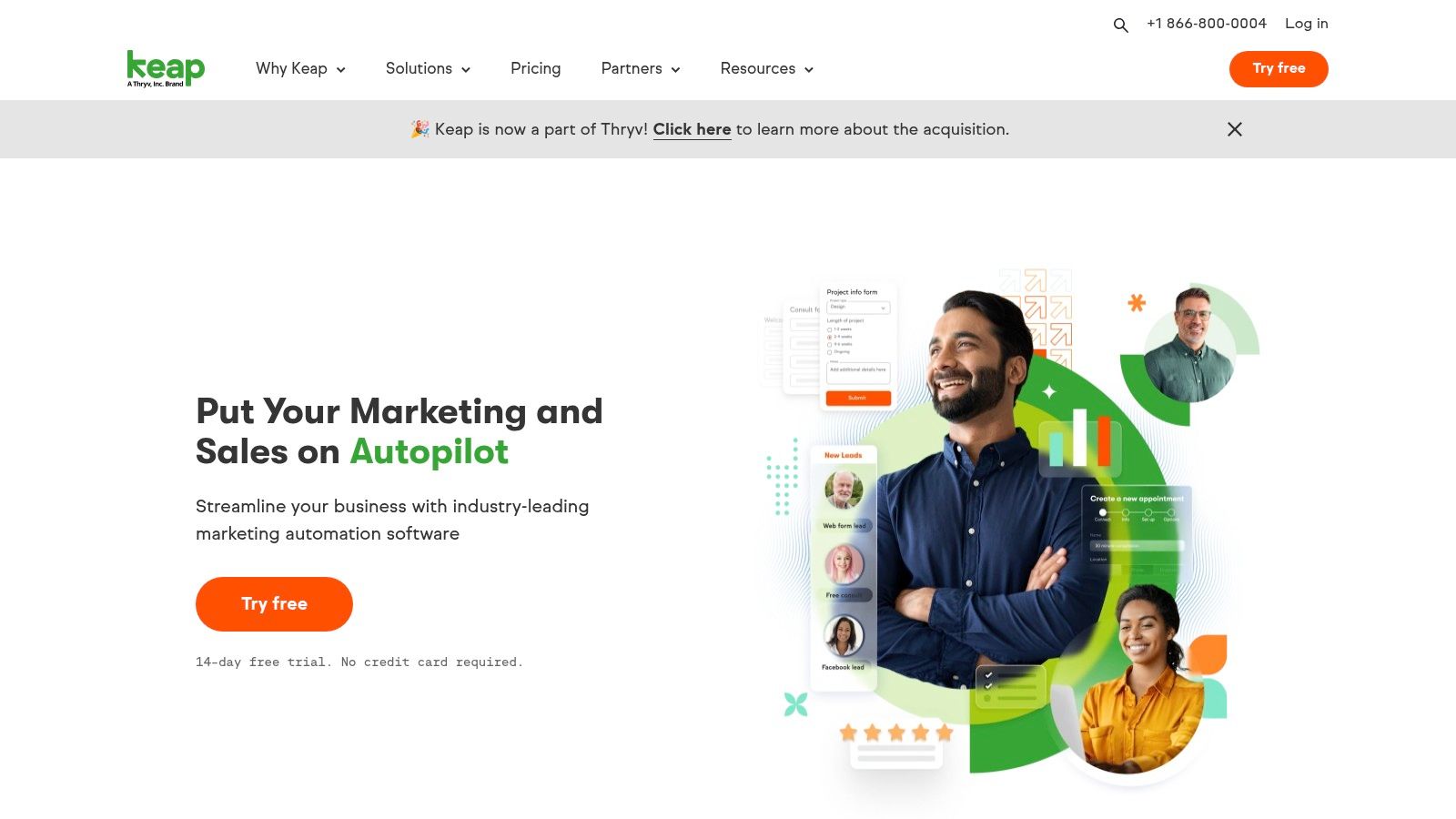
The platform's strength lies in its "Easy Automations" and advanced "Campaign Builder," which allow for the creation of customized workflows. Users can trigger sequences based on a wide array of actions, such as a contact submitting a form, clicking a link, or making a purchase. This level of customization makes it a powerful tool for businesses with specific, multi-step sales and follow-up processes.
Key Features & Pricing
- Core Functionality: Integrated CRM, email marketing automation, sales pipeline management, and appointment scheduling.
- Ideal Use Case: Service-based small businesses, coaches, or consultants who need to manage client relationships, sales, and invoicing in one place.
- Pricing: Keap's plans start with the "Pro" tier (around $159/month for 2 users, billed annually), with a "Max" tier offering more advanced features. They often require a one-time expert coaching fee for new users to ensure proper setup.
Pros:
- Comprehensive all-in-one solution combining CRM, sales, and marketing.
- Highly customizable automation capabilities with the Campaign Builder.
- Strong customer support and coaching to help with implementation.
Cons:
- The starting price point is higher than many competitors.
- Can have a steeper learning curve, especially for those new to automation.
Website: https://keap.com
6. Drip
Drip positions itself as a specialized marketing automation tool for small business, with a laser focus on the e-commerce sector. It is an "Ecommerce CRM" designed to help online stores build personal and profitable relationships with their customers at scale. Drip’s primary strength lies in its deep integrations with major e-commerce platforms like Shopify, Magento, and WooCommerce, allowing it to pull in rich customer data and purchase history for hyper-targeted campaigns.
The platform enables retailers to move beyond generic email blasts. Instead, they can create complex automation workflows based on specific user behaviors, such as abandoning a cart, viewing a product, or making a first-time purchase. This focus on actionable e-commerce data makes it a powerful tool for driving repeat sales and increasing customer lifetime value, setting it apart from more generalized marketing platforms.
Key Features & Pricing
- Core Functionality: Advanced e-commerce segmentation, personalized email and SMS marketing, visual automation workflows, and deep revenue-focused analytics.
- Ideal Use Case: An established or growing small business in the e-commerce space that needs to leverage customer behavior and purchase data for sophisticated, revenue-driving automation.
- Pricing: Drip's pricing is primarily based on the number of contacts in your list. Plans start at around $39/month for up to 2,500 contacts and include email and SMS features, with costs scaling upwards as your audience grows.
Pros:
- Purpose-built for e-commerce with excellent native integrations.
- Powerful segmentation and tagging based on customer purchase behavior.
- Clean, user-friendly interface that simplifies complex automation.
Cons:
- Pricing model based on contacts can become expensive for stores with large lists.
- May be too specialized for non-e-commerce businesses.
Website: https://www.drip.com
7. Omnisend
Omnisend carves out its niche as a powerful marketing automation tool for small business, with a laser focus on the e-commerce sector. Its strength lies in tightly integrating email and SMS marketing directly into the online retail experience. This allows store owners to create highly relevant customer journeys, from abandoned cart reminders to post-purchase follow-ups, all within a single, unified platform that speaks the language of e-commerce.
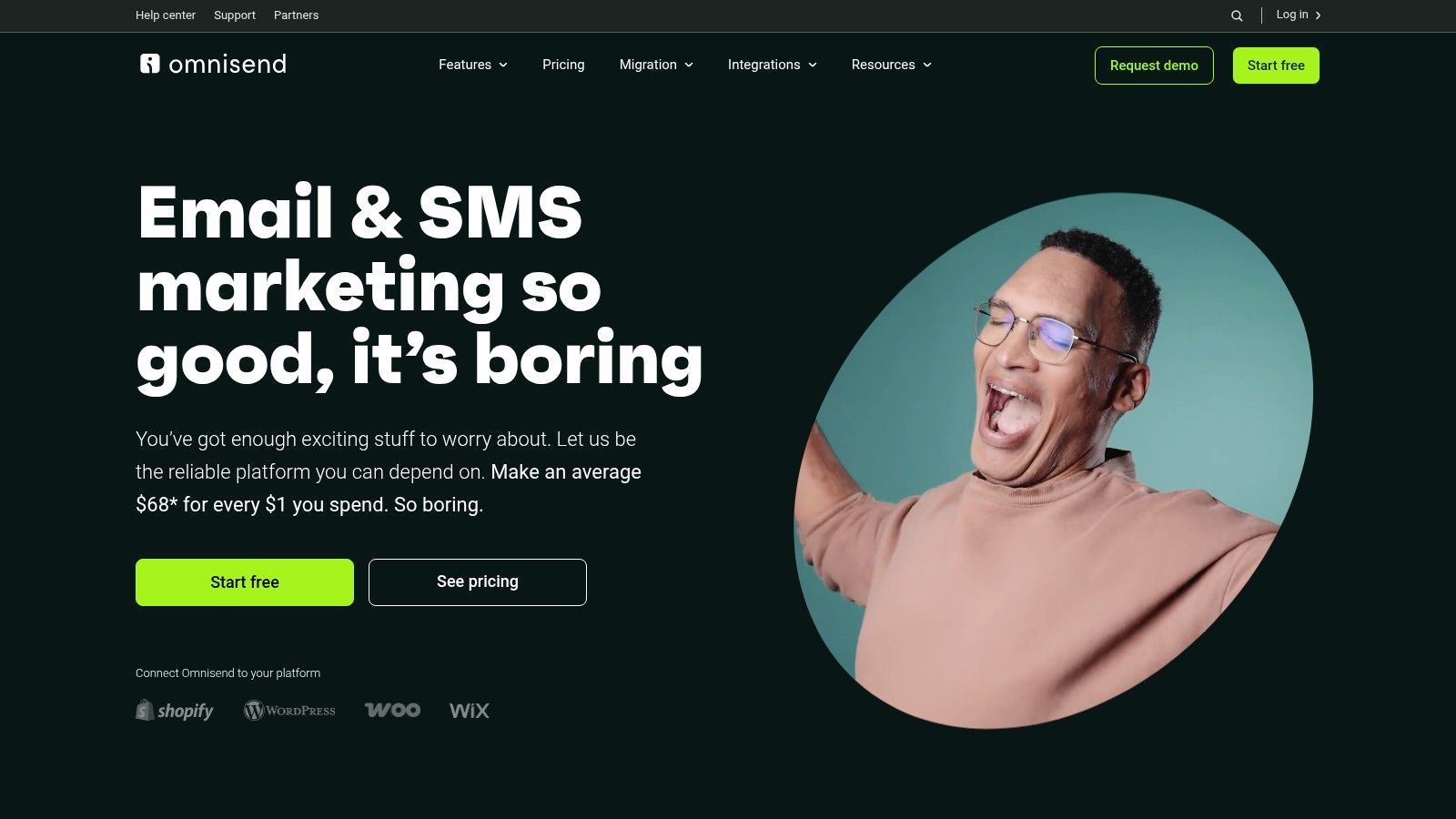
The platform stands out with its library of pre-built automation workflows designed specifically for online stores. Features like dynamic product recommendations and shoppable emails are built-in, making it simple to boost sales without a steep learning curve. The user interface is clean and centered around campaign creation and performance tracking, helping users quickly launch and measure their marketing efforts.
Key Features & Pricing
- Core Functionality: Integrated email & SMS campaigns, e-commerce-specific automation workflows, advanced segmentation, and shoppable email templates.
- Ideal Use Case: Small to medium-sized e-commerce businesses on platforms like Shopify, BigCommerce, or WooCommerce looking for an all-in-one email and SMS solution.
- Pricing: Omnisend offers a free plan for up to 250 contacts. Paid plans include "Standard" (from $16/month) and "Pro" (from $59/month), which unlocks unlimited emails and more advanced features.
Pros:
- Excellent e-commerce-specific features and integrations.
- Combines email and SMS marketing seamlessly in one workflow.
- Affordable and scalable pricing plans for growing stores.
Cons:
- Less suited for non-e-commerce businesses like B2B or service providers.
- SMS credits are an additional cost on top of the monthly plan.
Website: https://omnisend.com
8. Constant Contact
Constant Contact has long been a trusted name in email marketing, making it a familiar entry point for many small businesses exploring automation. Its strength lies in its simplicity and focus on core email marketing functions. While it may not have the sprawling, complex workflow builders of other platforms, it excels at providing accessible automation features that deliver immediate value, such as welcome series, abandoned cart reminders, and automated birthday emails.
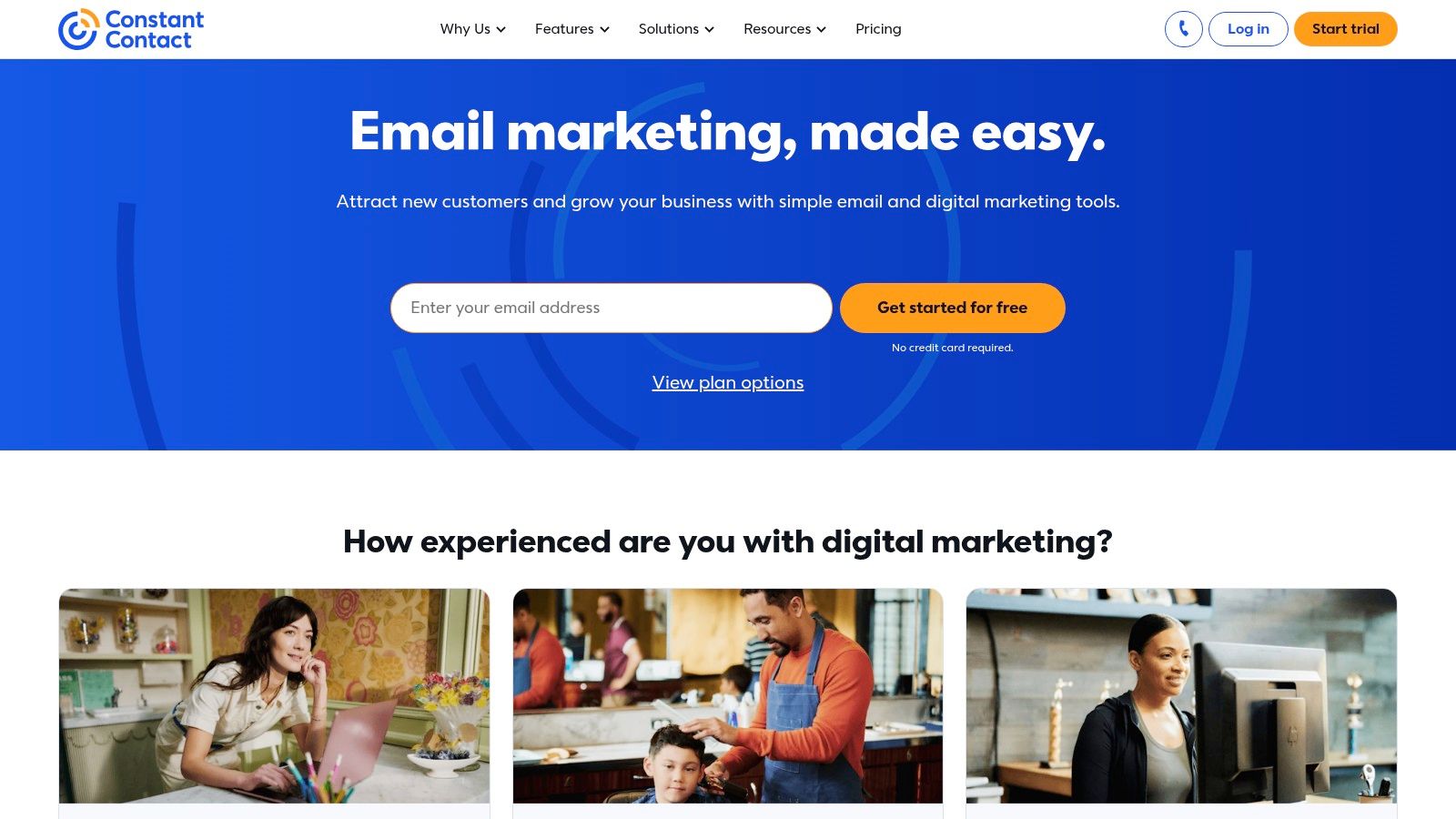
This platform stands out for its exceptional customer support and extensive library of educational resources, which are invaluable for business owners who are wearing many hats. For businesses that need reliable, easy-to-use email marketing automation tools for small business without the complexity of an all-in-one system, Constant Contact is a top-tier choice. Its added tools for social media posting and event management create a well-rounded, yet manageable, marketing toolkit.
Key Features & Pricing
- Core Functionality: Drag-and-drop email editor, automated email series (welcome, anniversary), list segmentation, and social media posting.
- Ideal Use Case: Small businesses, nonprofits, and solopreneurs who need a straightforward, user-friendly tool primarily for email marketing and basic automation.
- Pricing: Plans are based on the number of contacts. The "Core" plan starts around $9.99/month and includes key email features. The "Plus" plan adds more advanced automation and segmentation, with pricing increasing as your list grows.
Pros:
- Extremely user-friendly interface and award-winning customer support.
- Excellent selection of professional email templates.
- Integrated tools for event marketing and social media management.
Cons:
- Automation capabilities are less sophisticated than dedicated automation platforms.
- Pricing can become less competitive for businesses with very large contact lists.
Website: https://constantcontact.com
9. GetResponse
GetResponse positions itself as a versatile, all-in-one marketing platform, making it a strong contender among marketing automation tools for small business. Its standout feature is the combination of traditional email automation with built-in webinar hosting capabilities, a unique offering at its price point. This integration allows businesses to seamlessly promote a webinar, host it, and follow up with attendees using automated sequences all within a single ecosystem.
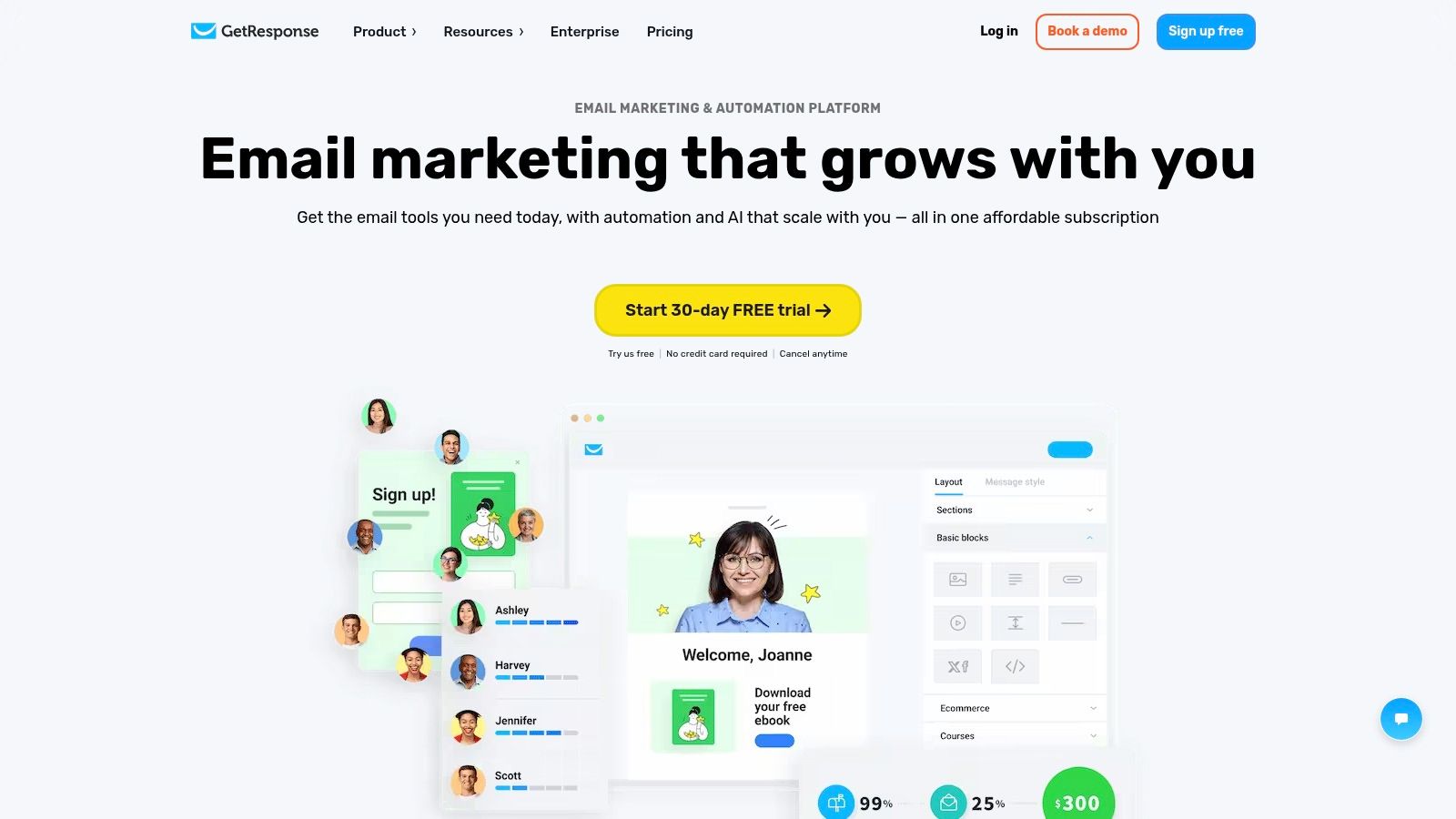
The platform provides a solid foundation for businesses focusing on lead generation and engagement through multiple channels. Its drag-and-drop workflow builder is intuitive, enabling users to create automation rules based on user behavior, such as clicks, opens, or website visits. While the user interface can sometimes feel slightly less modern than some competitors, its functionality and breadth of features offer substantial value.
Key Features & Pricing
- Core Functionality: Email marketing, automation workflows, webinar hosting, and a landing page and form builder.
- Ideal Use Case: Small businesses, course creators, or consultants who regularly use webinars as a core part of their marketing and sales funnel.
- Pricing: GetResponse offers a "Free Forever" plan with basic email and website tools. Paid plans start with "Email Marketing" (around $15/month), with "Marketing Automation" and "Ecommerce Marketing" tiers adding more advanced features and higher contact limits.
Pros:
- Comprehensive all-in-one feature set including unique webinar functionality.
- Affordable and transparent pricing plans suitable for tight budgets.
- Highly regarded for its responsive 24/7 live chat customer support.
Cons:
- The user interface can feel somewhat dated compared to newer platforms.
- Fewer native third-party integrations than some market leaders.
Website: https://getresponse.com
10. Pipedrive
Pipedrive is a sales-first CRM that has successfully integrated powerful automation capabilities, making it a unique choice among marketing automation tools for small business. It is designed around the concept of a visual sales pipeline, helping teams track leads and deals with exceptional clarity. Its key differentiator is this laser focus on the sales process; the automation is built to support and streamline sales activities, not just marketing campaigns.
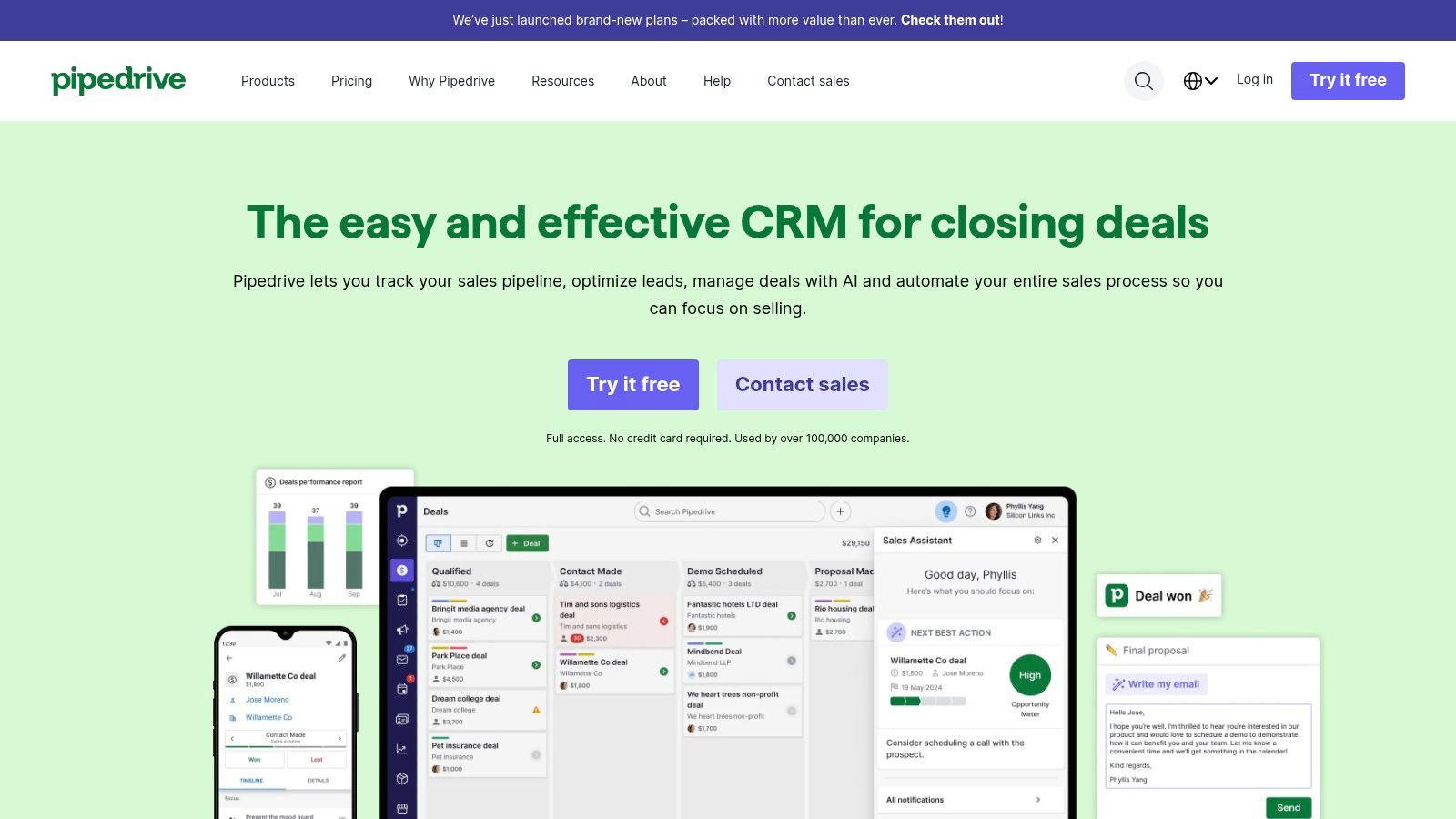
The platform shines with its intuitive drag-and-drop interface for managing deals through various stages. Users can automate follow-up emails, schedule activities, and move deals along the pipeline based on specific triggers. This ensures no lead falls through the cracks and that the sales team always knows the next step, making it ideal for businesses where the sales cycle is central to their operations.
Key Features & Pricing
- Core Functionality: Visual sales pipeline management, email integration with automation, activity and task automation, and detailed sales reporting.
- Ideal Use Case: Sales-driven small businesses that need to automate their deal flow and follow-up processes, rather than complex marketing nurture sequences.
- Pricing: Pipedrive offers several tiers, starting with the "Essential" plan (around $14/user/month, billed annually). The "Advanced" and "Professional" plans unlock more significant automation features.
Pros:
- Extremely intuitive and visual interface focused on the sales pipeline.
- Highly customizable to fit nearly any sales process.
- Affordable entry-point pricing for core CRM and automation.
Cons:
- Marketing automation features are less comprehensive than dedicated marketing platforms.
- Advanced reporting and full automation capabilities are locked behind higher-tier plans.
Website: https://pipedrive.com
11. Klaviyo
Klaviyo has carved out a powerful niche as one of the essential marketing automation tools for small business, specifically those in the e-commerce space. Its strength lies in its deep, data-driven integrations with platforms like Shopify, BigCommerce, and Magento. This connection allows it to pull rich customer data, such as browsing history and past purchases, to create highly targeted and personalized email and SMS campaigns.
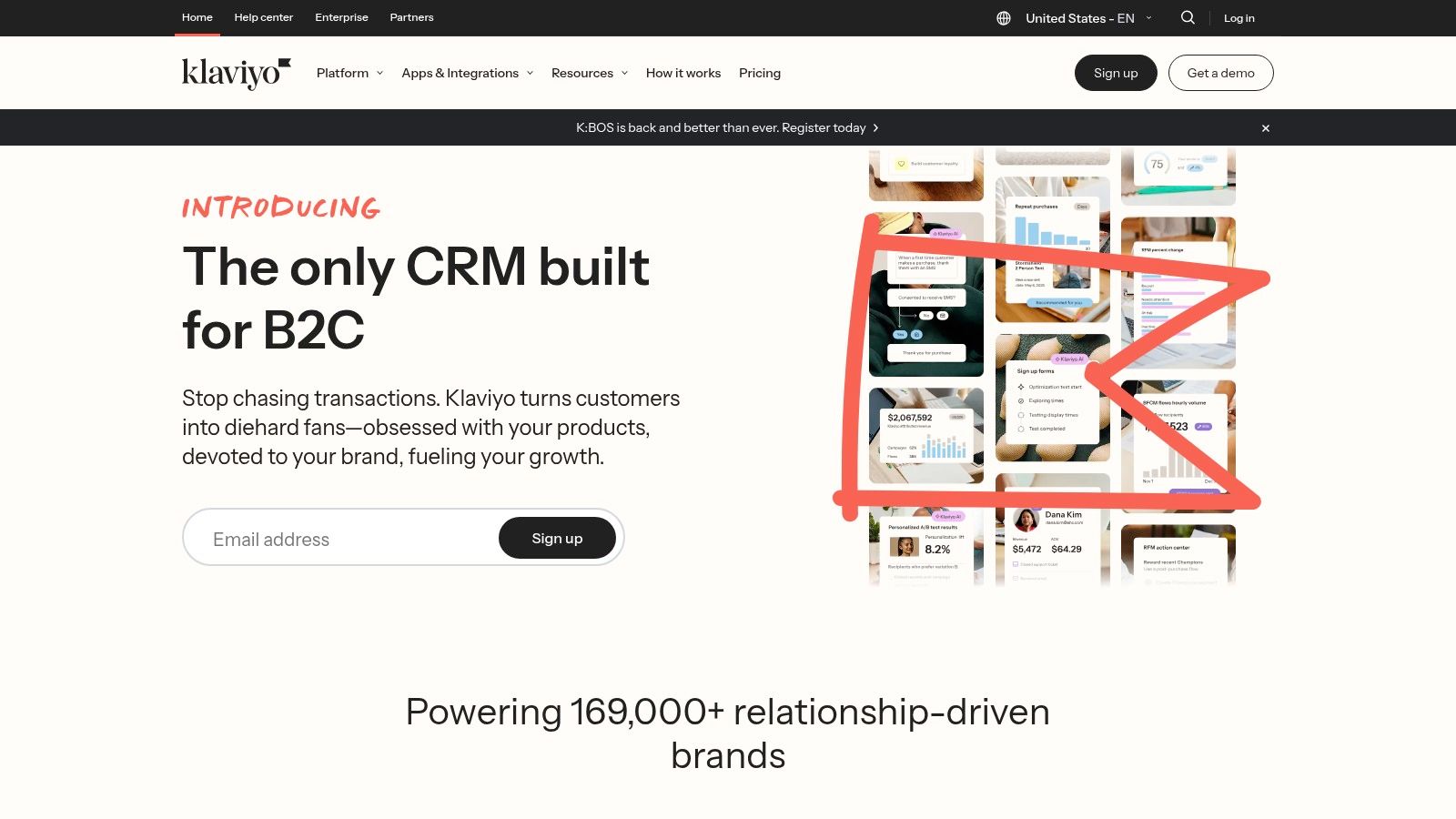
The platform empowers online stores to automate sophisticated flows like abandoned cart reminders, browse abandonment follow-ups, and post-purchase thank-you sequences. For businesses ready to get started, following a step-by-step Klaviyo integration guide can streamline the setup process and unlock its full potential much faster. Its predictive analytics features also help forecast customer lifetime value and churn risk, providing actionable insights for retention marketing.
Key Features & Pricing
- Core Functionality: Advanced e-commerce segmentation, integrated email and SMS marketing, A/B testing, and predictive analytics.
- Ideal Use Case: An e-commerce business of any size that wants to leverage customer behavior data for hyper-personalized marketing.
- Pricing: Klaviyo offers a free tier for up to 250 contacts. Paid plans are flexible and scale based on the number of contacts and email/SMS volume, starting around $20/month for 500 contacts.
Pros:
- Exceptional e-commerce platform integrations and data synchronization.
- Powerful and granular segmentation capabilities.
- Scalable pricing that grows with your business.
Cons:
- Can become expensive for businesses with very large contact lists.
- The advanced features may present a learning curve for new users.
Website: https://www.klaviyo.com
12. Zoho Marketing Automation
Zoho Marketing Automation is a strong contender for small businesses already invested in or considering the Zoho ecosystem. Its greatest strength lies in its native integration with other Zoho products, particularly Zoho CRM, creating a unified customer data platform. This eliminates the need for complex, often fragile, third-party integrations, ensuring a smooth flow of information from lead generation through to sales and customer retention for a holistic business view.
The platform provides a solid suite of marketing automation tools for small business needs without an overwhelming interface. It focuses on core functionalities like lead management, behavior tracking, and multi-channel communication. Users can build automated journeys that engage leads based on their website activity, email interactions, and demographic data, making it a practical choice for businesses looking to implement fundamental automation strategies efficiently and affordably.
Key Features & Pricing
- Core Functionality: Email marketing with automation workflows, lead scoring and management, social media marketing tools, and web behavior tracking.
- Ideal Use Case: Small to mid-sized businesses that use or plan to use Zoho CRM and other Zoho apps, seeking a cost-effective, all-in-one solution.
- Pricing: Zoho offers a free-forever plan with basic features. Paid plans are competitively priced, starting with the "Standard" tier (around $15/month, billed annually) and scaling up to "Professional" and "Ultimate" for more contacts and advanced features.
Pros:
- Affordable pricing structure makes it accessible for small businesses.
- Seamless, deep integration with the extensive Zoho ecosystem.
- Offers a comprehensive feature set for the price point.
Cons:
- The user interface can feel less modern compared to some competitors.
- Limited third-party integrations outside of the Zoho suite.
Website: https://www.zoho.com/marketingautomation/
Marketing Automation Tools Comparison: Top 12 Features & Pricing
| Platform | Core Features | User Experience ★★★★☆ | Value Proposition 💰 | Target Audience 👥 | Unique Selling Points ✨ | Price Range 💰 |
|---|---|---|---|---|---|---|
| HubSpot Marketing Hub | Email automation, CRM, analytics | Intuitive, scalable | Extensive resources, scalable | Small to medium businesses | All-in-one platform, educational support 🏆 | Mid to High |
| ActiveCampaign | Email, CRM, advanced automation | Customizable, but complex for beginners | Strong integration, flexible | Small businesses, marketers | Powerful automation workflows ✨ | Mid to High |
| Mailchimp | Email campaigns, segmentation, analytics | User-friendly, free plan available | Good free plan, many integrations | Small businesses, beginners | Extensive free plan, easy to use | Free to Mid |
| Brevo (Sendinblue) | Email & SMS marketing, automation | Easy to use, great deliverability | Competitive pricing | Small businesses | SMS marketing, affordable plans ✨ | Free to Low-Mid |
| Keap (Infusionsoft) | CRM, marketing, sales pipeline | Comprehensive but steep learning curve | All-in-one solution | Small businesses, service providers | Invoicing & appointment scheduling ✨ | Mid to High |
| Drip | Email marketing, ecom integrations | User-friendly, e-commerce focused | Tailored for online retailers | E-commerce businesses | Advanced segmentation, revenue tracking ✨ | Mid to High |
| Omnisend | Email & SMS, automation, segmentation | Easy automation builder | Affordable pricing | E-commerce stores | Product recommendations ✨ | Low to Mid |
| Constant Contact | Email marketing, social media | User-friendly | Strong support, educational resources | Small businesses, nonprofits | Event management tools | Mid |
| GetResponse | Email, landing pages, webinars | Feature-rich, interface somewhat outdated | Affordable, versatile | Small businesses | Webinar hosting, landing pages | Low to Mid |
| Pipedrive | Sales pipeline, email automation | Intuitive and visual | Affordable, customizable | Small sales teams | Visual pipeline management | Low to Mid |
| Klaviyo | Email/SMS, segmentation, ecom focused | Powerful but has learning curve | Scalable for growth | E-commerce brands | Advanced segmentation and personalization ✨ | Mid to High |
| Zoho Marketing Automation | Email, lead management, social tools | Integrated with Zoho ecosystem | Affordable | Small businesses in Zoho ecosystem | Strong Zoho integration | Low to Mid |
Automate, Grow, and Reclaim Your Time
Navigating the landscape of marketing automation tools for small business can feel overwhelming, but the potential reward is transformative. As we've explored, the right platform isn't just about sending emails; it's a central nervous system for your marketing efforts, designed to save your most valuable asset: time. From all-in-one powerhouses like HubSpot and ActiveCampaign to e-commerce specialists like Klaviyo and Omnisend, the perfect fit for your unique business goals exists.
The key takeaway is that there is no single "best" tool, only the tool that is best for you. Your decision should be guided by your specific stage of growth, your technical comfort level, and your primary marketing channels. A B2B service company might prioritize the CRM-centric features of Keap or Pipedrive, while a direct-to-consumer brand will find immense value in the sophisticated e-commerce workflows of Drip or Klaviyo.
Making Your Final Decision
To choose wisely, revisit your core business needs. Don't be swayed by an endless list of features you may never use. Instead, focus on the practical application and how a tool will solve your immediate challenges.
Consider these final guiding questions before you commit:
- Scalability: Will this platform grow with my business over the next 1-3 years? Look at the pricing tiers and the features unlocked at each level.
- Integration: How well does this tool connect with my existing technology stack, such as my website CMS, e-commerce platform, or social media schedulers? Seamless integration is non-negotiable for true automation.
- Support & Onboarding: What level of customer support and training resources are available? A tool is only as good as your ability to use it effectively. Platforms like HubSpot and ActiveCampaign are known for their extensive educational content.
- True Cost: Beyond the monthly subscription, are there hidden costs for contact list size, email send volume, or premium features? Calculate the total cost of ownership based on your projected growth.
Implementation and Beyond
Once you've made a selection, start small. Focus on automating one or two high-impact workflows, such as a new subscriber welcome series or a lead nurturing sequence for abandoned carts. Master these before expanding into more complex automations. This incremental approach prevents overwhelm and allows you to demonstrate ROI quickly.
Furthermore, remember that automation enhances, but does not replace, the human element of marketing. Use the time you save to engage more deeply with your customers, create higher-quality content, and analyze your performance data to refine your strategy. For a deeper dive into how specific channels like SMS can be leveraged for automated engagement, enhancing your ability to automate, grow, and reclaim time, explore some of the leading SMS automation tools for even more specialized workflows.
Ultimately, investing in marketing automation is an investment in your business's future and your own sanity. By choosing the right platform and implementing it strategically, you can create a powerful engine for sustainable growth, allowing you to step back from the day-to-day grind and focus on the big-picture vision for your brand.
Ready to apply your marketing automation expertise in a new role or build a team of specialists? Influencer Marketing Jobs is the premier destination for connecting talented professionals with leading brands and agencies. Find your next opportunity or hire your next star performer on a platform dedicated to the marketing industry. Visit Influencer Marketing Jobs to explore curated listings today.